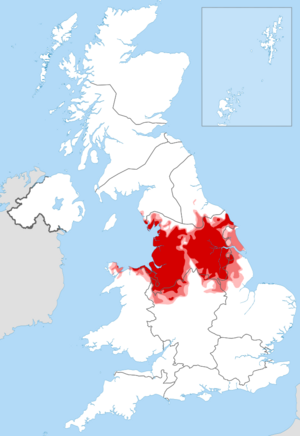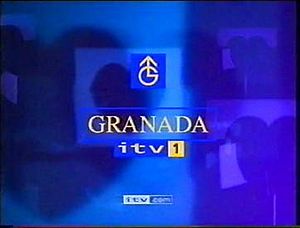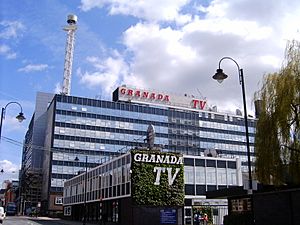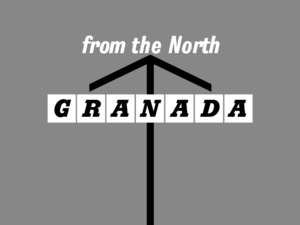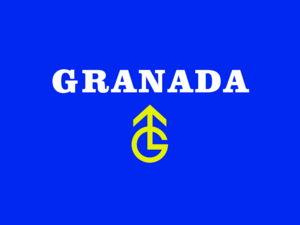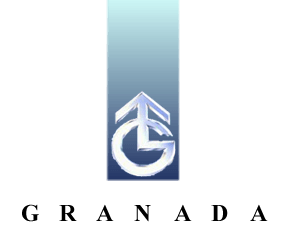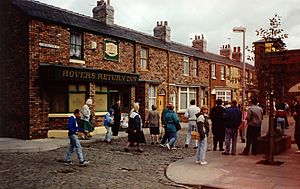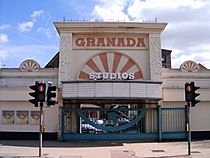ITV Granada facts for kids

Logo used since 2013
|
|
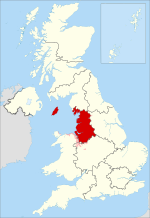
The ITV Granada region
|
|
| Type | Region of television network |
|---|---|
| Branding | ITV1 |
| Country | |
| First air date | 3 May 1956 |
| Headquarters |
|
| Broadcast area |
|
| Owner |
|
| Dissolved | Lost on-air identity on 27 October 2002 (now known as ITV1 at all times) |
| Former names | Granada Television |
| Picture format | 1080i HDTV, downscaled to 576i for SDTV |
| Affiliation | ITV |
| Language | English |
| Replaced by | Yorkshire Television in Yorkshire from 1968 |
ITV Granada, once known as Granada Television, is a major part of the ITV television network. It broadcasts to the North West of England and the Isle of Man. From 1956 to 1968, it showed programs on weekdays in both the North West and Yorkshire. Another company, ABC Weekend Television, covered weekends.
Granada Television was famous for its unique northern style. Many of its shows had a "social realism" feel, meaning they showed real-life situations. It was also known for its excellent dramas and documentaries. Before its parent company merged with Carlton Communications to form ITV plc, Granada was the biggest independent TV producer in the UK. It made about 25% of all programs for the ITV network.
Sidney Bernstein founded Granada Television at Granada Studios in Manchester. It is the only original TV company from 1954 that is still broadcasting today. Its broadcast area includes Cheshire, Greater Manchester, Lancashire, Merseyside, and parts of Derbyshire, Staffordshire, Cumbria, and North Yorkshire. In 2009, the Isle of Man also became part of Granada's broadcast area.
Granada Television started broadcasting on May 3, 1956. It had a special "G" logo that looked like an arrow pointing north, often with the slogan "Granada: from the North." In 2004, Granada plc merged with Carlton Communications to create ITV plc. Today, the Granada name is mostly used for local news bulletins. The main ITV branding is used for all other programs.
The North West region is seen as ITV's most successful area. Many Granada programs have been listed among the best British TV shows. Some famous ones include Sherlock Holmes, Coronation Street, Seven Up!, The Royle Family, The Jewel in the Crown, Brideshead Revisited, World in Action, University Challenge, Stars in Their Eyes and The Krypton Factor. Many talented people worked there, like Paul Greengrass, Michael Apted, and Russell T Davies.
Contents
How ITV Granada Started
Early Days as a Cinema Company
Granada first started as Granada Theatres Ltd in 1930. This company owned movie theaters in southern England. Sidney Bernstein and his brother Cecil founded it. They named it after the city of Granada in Spain, which Sidney had visited.
In the 1950s, the Bernsteins became interested in commercial television, which was a new competitor to cinemas. They decided to bid for a TV license for the North of England. In 1954, the Independent Television Authority (ITA) gave Granada the contract to broadcast from Monday to Friday in the North. ABC Weekend TV covered the same area on weekends. These companies used transmitters at Winter Hill and Emley Moor. These covered major cities like Liverpool, Manchester, Leeds, and Sheffield.
Sidney Bernstein chose Manchester as the main base for Granada Television. He believed the North had a strong culture and was a great place for a new creative industry. Granada Studios, designed by architect Ralph Tubbs, was built on Quay Street in Manchester city centre.
Granada Television began broadcasting on May 3, 1956. It was the fifth TV company to go on air. It quickly became known for its northern identity.
Financial Challenges and Success
Many early ITV companies saw their regions as temporary steps to get a London license. But Granada wanted to build a strong northern identity. They used northern voices and made programs about northern life. Sidney Bernstein even insisted that employees live in or travel to Manchester.
Granada invested a lot in building new studios. This caused financial problems, and by late 1956, the company was almost out of money. Granada sought help from Associated-Rediffusion, a London TV station. They made a secret deal where Associated-Rediffusion would cover Granada's debts for a share of its profits.
However, ITV quickly became very popular, and Granada started making money. By the early 1960s, Granada was doing well. Its soap opera Coronation Street became a huge hit. Simple game shows like Criss Cross Quiz and University Challenge also became popular.
Changes to Broadcast Areas
In 1968, Granada's contract changed. It began broadcasting seven days a week in the North West from the Winter Hill transmitter. Yorkshire became a separate region, with Yorkshire Television broadcasting there. Sidney Bernstein was very unhappy about this split.
Granada kept its license in 1980. It then invested in big drama series like The Jewel in the Crown and Brideshead Revisited. By the late 1990s, British TV companies started merging to compete better globally.
In 1991, companies had to bid for TV regions. Mersey Television offered more money than Granada, but Granada won because its plan met the "quality threshold." Granada owned popular shows like Coronation Street, and it threatened to sell them to satellite TV if it lost its license. The government then made rules easier, allowing ITV companies to buy others. Granada bought several companies, including LWT in 1994 and Yorkshire-Tyne Tees Television in 1997.
By 2002, Granada and Carlton Television owned almost all ITV companies in England and Wales. This created a "duopoly," meaning two companies controlled most of the network.
Granada faced financial difficulties and closed the Granada Studios Tour in 2001. This was partly because Coronation Street started making more episodes, needing the set full-time. The rise of digital TV also reduced ITV's audience and advertising money. The failure of ITV Digital, a joint venture with Carlton, cost both companies over £1 billion.
ITV Granada Today
On October 28, 2002, Granada was rebranded as ITV1 Granada. The Granada name was shown before regional programs, but this stopped later. Now, its name has mostly disappeared from screens, like other ITV regional names. All announcements are made from London.
On February 2, 2004, Granada merged with Carlton to form ITV plc. This was more like a takeover by Granada, which was a much larger company. Granada owned 68% of the shares.
From November 1, 2004, Granada productions were credited as "Granada Manchester." On September 21, 2005, it was announced that the Granada name would no longer appear at the end of programs. The in-house production part was renamed ITV Productions. The Granada name and logo were still used for programs made for other networks, like University Challenge for BBC Two, until 2009.
On November 13, 2006, Granada lost its on-air identity. Regional programs were just called ITV1 or ITV1 Granada. Local news was branded Granada News, except for the main 6 PM Granada Reports bulletin. In 2009, ITV removed the Granada brand from all departments, including its international production arm, which became ITV Studios America.
ITV made job cuts in 2009 but Granada was not as affected. ITV is required to produce 50% of its programs outside London. To meet this, Manchester remains a key northern hub. ITV Granada moved to MediaCityUK on March 25, 2013, showing its commitment to the region.
Granada Studios
Granada built a brand new studio complex on Quay Street in Manchester. These studios were the first purpose-built television studios in the United Kingdom. Sidney Bernstein exaggerated the size of the studios to make Granada seem like a big rival to the BBC. He gave the studios only even numbers, so it looked like there were twelve, even though there were only six.
In September 2010, the famous red "Granada TV" sign on the roof of Granada Studios was removed for safety reasons. The Museum of Science and Industry (MOSI) now owns the sign, as it is important to Manchester's history.
Moving to MediaCityUK
After the ITV merger in 2004, there was talk of selling the Quay Street site. ITV considered moving to MediaCityUK in Salford Quays, where the BBC had already moved. After several years of discussions, Granada announced on December 16, 2010, that it would move to the Orange Building in MediaCityUK. It also planned to build a new studio there for Coronation Street. Building work began on September 6, 2011. ITV Granada officially moved to MediaCityUK on March 25, 2013.
Granada's Identity
Throughout its history, Granada Television used a logo of an arrow pointing north. This was often with the tagline "from the North." Sidney Bernstein wanted to show a strong northern identity.
Granada Television was seen as "bolder" and more "gritty" than other ITV companies and the BBC. It focused on showing a northern style that made it stand out. Bernstein believed the North had "untapped creative energy" that needed to be developed.
In 1958, just two years after it started, Granada's northern style was very clear. Kenneth Clark, from the ITA, noted how different Granada was from other TV companies. Peter Salmon of the BBC said, "Granada Television made TV programmes in the north west; for northerners, reflecting northern culture and attitudes."
Idents (On-Screen Logos)
From its launch in 1956, Granada used logos with a thin arrow pointing upwards and the word "Granada" in boxes. The arrow pointed to the "N" in Granada, showing it pointed north. Sometimes it would animate to reveal the slogan "from the North."
In 1969, the famous pointed "G" logo was introduced. This logo included the upward-pointing arrow within the letter "G." This became the logo for the entire Granada Group. It was first white on a grey background, then changed to a yellow "G" on a blue background when color TV arrived.
In 1986, for its 30th anniversary, Granada used a computer-animated pointed "G." Later that year, it switched to a gold or chrome 3D pointed "G" on a blue background. Granada also used "in-vision continuity," where northern presenters would give messages before programs.
In 1989, Granada launched a new look with a see-through pointed G that rotated into place over a natural scene. Granada refused to use the first ITV generic logo because their "G" logo didn't fit correctly.
On June 4, 1990, Granada changed its on-screen branding again. A blue stripe with the pointed "G" would descend from the top of the screen against a white background. This was updated in 1995 with a larger "G" on a blue stripe against a colorful background.
In 1999, Granada adopted the generic "hearts idents" used by other ITV companies. The pointed G logo was made thinner and placed in a box. This dual branding of Granada Television and ITV lasted until October 28, 2002, when regional names were dropped for the new ITV1 brand. The Granada name was still used for local programs until January 16, 2006.
On January 14, 2013, ITV1 changed back to its original name, ITV.
Famous Programmes
In 1958, Granada Television broadcast coverage of the 1958 Rochdale by-election. This was the first election covered on British television.
Granada was known for its bold documentaries like Seven Up!, which started in 1964. This program followed the lives of 14 British children from age seven, checking in with them every seven years. It explored whether their dreams came true. The latest part, 63 Up, premiered in 2019. Seven Up was part of the World in Action documentary series (1963-1998). This series was famous for its tough investigative journalism. It helped prove the innocence of the Birmingham Six in 1985.
The classic northern soap opera Coronation Street began on December 9, 1960. It is still produced today, making it the longest-running television soap opera in the world. Big events like the "2010 Tram Crash" were filmed at the studio. Granada also made gritty drama series like A Family at War (1970–72), set during World War II.
Granada produced many acclaimed dramas for an international audience, including The Stars Look Down (1975), Brideshead Revisited (1981), The Adventures of Sherlock Holmes (from 1984), and The Jewel in the Crown. These shows were sold worldwide by Granada Television International.
Another long-running program was the quiz show University Challenge, which aired from 1962 to 1987. The BBC revived it in 1994, but Granada still produced it. The company also made The Krypton Factor (1977–1995). What The Papers Say, which discussed newspaper reports, started on Granada in 1956.
In the 1970s and 1980s, Granada produced many situation comedies about life in the North West, such as Nearest and Dearest, The Lovers, and Watching.
Granada also featured pop music with shows like Lift Off with Ayshea and Shang-a-lang. So It Goes, presented by Tony Wilson, showcased punk music, bringing bands like the Sex Pistols and the Clash to TV.
Key People at Granada
Denis Forman, chairman from 1974-87, and David Plowright, chairman from 1987–92, were important leaders during Granada Television's most successful years. They were known for their "non-conformist" and "non-London" approach.
Granada Television helped many broadcasters start their careers. Many directors, producers, and writers who worked there went on to create their own production companies or achieve high positions, like Director-General of the BBC.
- Directors, Producers, and Writers
- Paul Abbott wrote for Coronation Street and created shows like Shameless.
- Michael Apted started his TV career at Granada and created the Up series documentaries.
- John Birt, Baron Birt began as a researcher for World in Action and later became Director-General of the BBC.
- Russell T Davies worked as a writer in the 1990s.
- Paul Greengrass directed World in Action before becoming a film director.
- Jeremy Isaacs oversaw World in Action and What the Papers Say.
- Jack Rosenthal was a writer who created shows like The Dustbinmen.
- Nicola Shindler was a script-writer for Cracker before starting her own production company.
- Presenters
- Gordon Burns presented Granada Reports and The Krypton Factor.
- Sacha Baron Cohen had a chat show on Granada Talk TV.
- Richard Madeley joined Granada in 1982 and met Judy Finnigan there.
- Lucy Meacock was a Granada news presenter for many years.
- Michael Parkinson began his TV career at Granada Television.
- Tony Wilson presented Granada Reports and music shows, earning him the nickname 'Mr Manchester'.
Other Granada Ventures
Granada Studios Tour
The Granada Studios Tour opened in 1988. It was an entertainment park on the Granada Studios back lot, based on television productions. Visitors could see a replica of 10 Downing Street and learn how TV shows were made. The main attraction was the set of Coronation Street.
G-Wizz
Granada launched G-Wizz, a website for some of its programs like This Morning and Coronation Street. It was very expensive and not many people used it because it was slow for internet connections at the time. Granada closed G-Wizz in March 2001 and combined its online presence with Carlton to launch itv.com.
Granada Sky Broadcasting
In 1996, Granada teamed up with BSkyB to create Granada Sky Broadcasting (GSB). This company provided content and new channels for satellite TV. Granada launched several channels that showed old programs from the Granada archive.
GSB operated as a joint venture until 2004 when ITV plc was formed. ITV then bought BSkyB's share. GSB was renamed "ITV digital channels Ltd."
ONdigital / ITV Digital
From 1997 to 2002, Granada and Carlton invested a lot of money in ONdigital, a digital terrestrial pay-TV service. ONdigital was rebranded ITV Digital in 2001. However, it struggled to compete with Sky Digital and stopped broadcasting on May 1, 2002. This failure led to big budget cuts and job losses at Granada.
Extra Channels
Granada Plus
Granada Plus was a general entertainment channel launched on October 1, 1996. It was a joint venture between Granada and British Sky Broadcasting. It showed archive material and was aimed at older audiences. It closed on November 1, 2004, and was replaced by ITV3.
Men & Motors
Men & Motors was a channel for male viewers, launched on the same day as Granada Plus. It showed programs about cars and motors. In 2004, it became a full-time channel. It ran until 2010, when it closed to make way for ITV HD. Many of its programs moved to ITV4.
Granada Breeze
Granada Breeze was another GSB channel launched on October 1, 1996. It was a lifestyle channel for women, showing programs on cooking, health, and home. It closed in March 2002 due to low viewing figures.
Other Channels
Wellbeing was a channel about health, which closed in 2003.
Granada Talk TV focused on chat shows but closed after less than a year.
Shop!, launched in 1998, was a shopping channel that closed in 2002.
See also
 In Spanish: ITV Granada para niños
In Spanish: ITV Granada para niños
- Media in Manchester
- ITV Studios – Granada Television's production arm
- Granada plc – Granada Television's parent company


